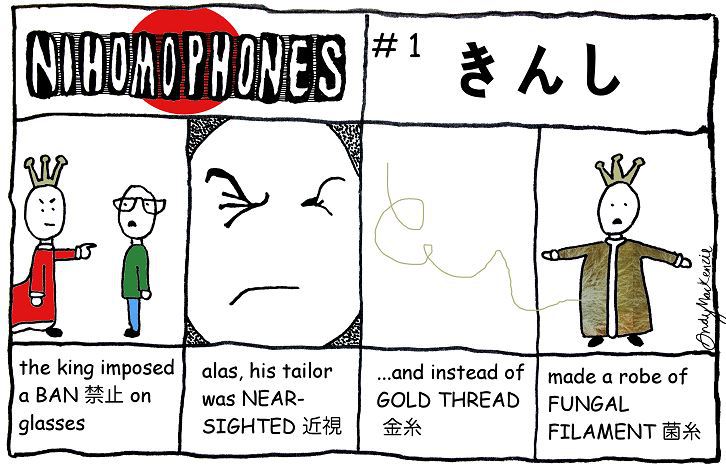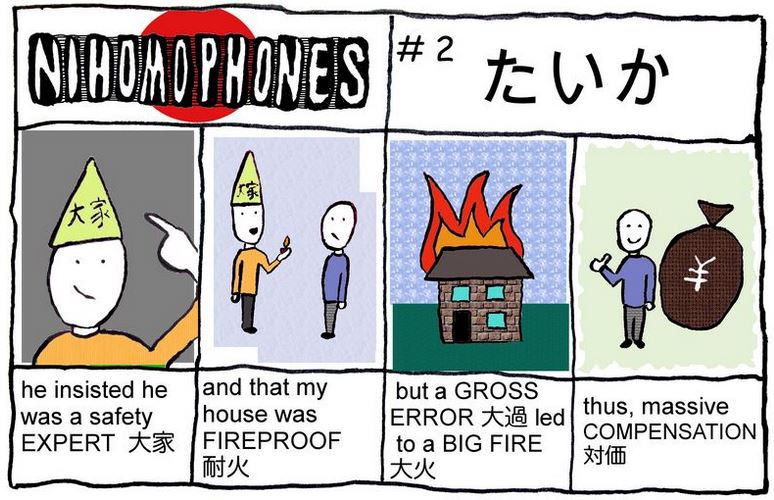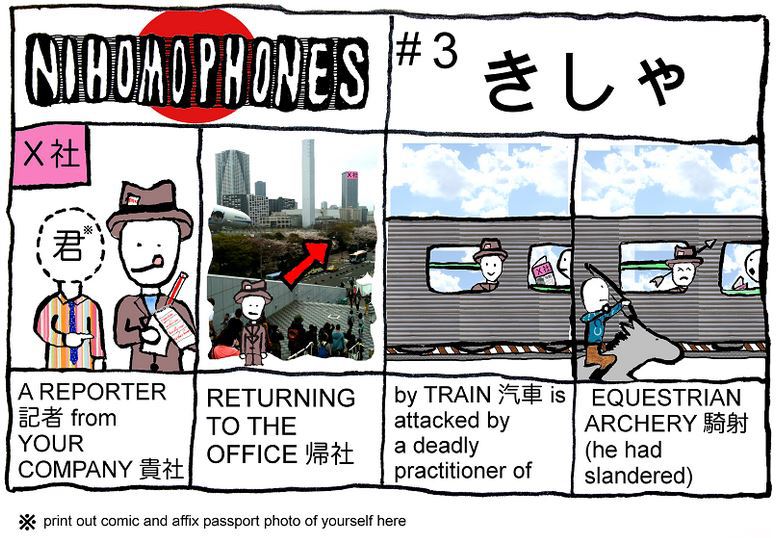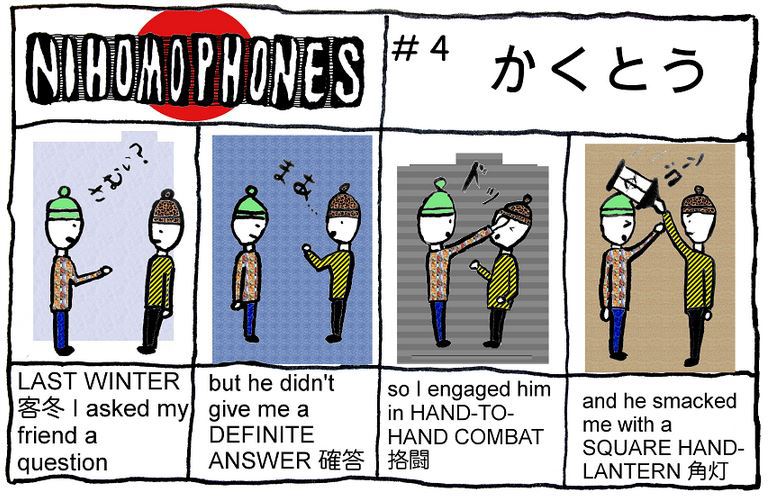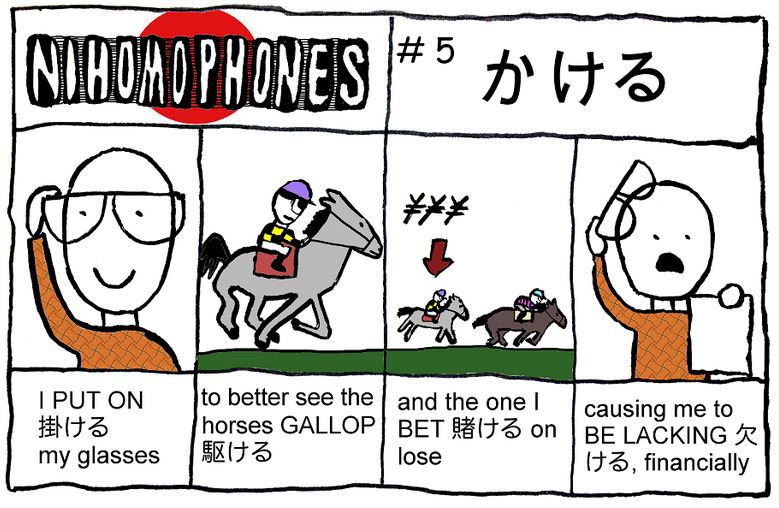If I were you, I'd try to memorize Hiragana/Katakana as soon as possible.Would anyone recommend Genki 1 without knowing the Hiragana/Katakana chart off by heart?
-
Ever wanted an RSS feed of all your favorite gaming news sites? Go check out our new Gaming Headlines feed! Read more about it here.
-
We have made minor adjustments to how the search bar works on ResetEra. You can read about the changes here.
Learning Japanese • 日本語の勉強 |これはOTです| ゆっくりしていいぞ!
- Thread starter Resilient
- Start date
You are using an out of date browser. It may not display this or other websites correctly.
You should upgrade or use an alternative browser.
You should upgrade or use an alternative browser.
If I were you, I'd try to memorize Hiragana/Katakana as soon as possible.
Alright I'll start with that then :)
Yeah, try to ditch Roumaji as soon as possible!
How often should I study each day?
That's up to you, enough that you're making progress each day I'd say! I learned hiragana and katakana by basically doing them over and over again until they stuck.
I finally feel comfortable with all the hiragana and katakana! Enough where I can soooort of read things (with zero comprehension). But the difference between things like つ and っ are hard to notice as I'm still learning.
I'm slowly working with Genki (as a solo venture, I'm just reading things out loud and doing the listening extensively). Any early game tips for learning phrases and memorizing vocab? I haven't had to really do that in...Uh...10+ years.
If you have access to them, the Dr. Moku Hiragana and Katakana apps are INCREDIBLE. They really helped me tremendously when it came to learning the kana.
I'm slowly working with Genki (as a solo venture, I'm just reading things out loud and doing the listening extensively). Any early game tips for learning phrases and memorizing vocab? I haven't had to really do that in...Uh...10+ years.
Would anyone recommend Genki 1 without knowing the Hiragana/Katakana chart off by heart?
If you have access to them, the Dr. Moku Hiragana and Katakana apps are INCREDIBLE. They really helped me tremendously when it came to learning the kana.
That's up to you, enough that you're making progress each day I'd say! I learned hiragana and katakana by basically doing them over and over again until they stuck.
Okay thank you!
I finally feel comfortable with all the hiragana and katakana! Enough where I can soooort of read things (with zero comprehension). But the difference between things like つ and っ are hard to notice as I'm still learning.
I'm slowly working with Genki (as a solo venture, I'm just reading things out loud and doing the listening extensively). Any early game tips for learning phrases and memorizing vocab? I haven't had to really do that in...Uh...10+ years.
If you have access to them, the Dr. Moku Hiragana and Katakana apps are INCREDIBLE. They really helped me tremendously when it came to learning the kana.
Will look into them thanks!
find a conversation teacher who you feel comfortable with working with you at your level
natural conversation is by far the best way i've grown in language because the feedback loop is near damn instantaneous
just remember to make notes about stuff
natural conversation is by far the best way i've grown in language because the feedback loop is near damn instantaneous
just remember to make notes about stuff
An oldie but goodie for DBZ fans, essentially a Japanese YouTube Poop (they call them MAD) featuring Broly, Vegeta and friends in a Super Mario Bros. setting. Never fails to make me laugh. The guy who made it had some brilliantly funny ideas.
There's also a version without the Nico Nico comments on the same channel.
The DBZ/Broly MAD scene is general is (was?) pretty big for some reason lol. I assume most of it can be attributed to this video cause it's clearly the best and most well-known of the bunch.
There's also a version without the Nico Nico comments on the same channel.
The DBZ/Broly MAD scene is general is (was?) pretty big for some reason lol. I assume most of it can be attributed to this video cause it's clearly the best and most well-known of the bunch.
Is whether you use Katakana, Hiragana or Kanji based on what you know? And Hiragana usually comes before Katakana?
Is whether you use Katakana, Hiragana or Kanji based on what you know? And Hiragana usually comes before Katakana?
Yes and no. Kanji is learned later, and there are far too many to learn at once, so the amount of kanji varies based off of intended reading level. Kanji might come with hiragana written above it so that you can learn the words. For young kids there may be no kanji at all.
If you're assumed to be comfortable with all of them, they're all used. Kanji would be used for nouns and the stems of verbs and adjectives and such. Hiragana is moreso for grammatical things; particles and verb endings and such. Katakana is for loanwords, or maybe just used for emphasis or some other stylistic purpose.
Yes and no. Kanji is learned later, and there are far too many to learn at once, so the amount of kanji varies based off of intended reading level. Kanji might come with hiragana written above it so that you can learn the words. For young kids there may be no kanji at all.
If you're assumed to be comfortable with all of them, they're all used. Kanji would be used for nouns and the stems of verbs and adjectives and such. Hiragana is moreso for grammatical things; particles and verb endings and such. Katakana is for loanwords, or maybe just used for emphasis or some other stylistic purpose.
Do native speakers sometimes not know Kanji? There are so many symbols and knowing how to write, read and translate seems really confusing.
Well, they aren't born knowing kanji, but from what I can tell the literacy rate is extremely high. I don't know if it's common for adults not to know kanji.Do native speakers sometimes not know Kanji? There are so many symbols and knowing how to write, read and translate seems really confusing.
If you're wondering if you should learn it, you probably should. Kanji's a pain to learn but it's actually great for reading since it reduces a lot of ambiguity. Hiragana and katakana are easy, so you can get that out of the way first.
Well, they aren't born knowing kanji, but from what I can tell the literacy rate is extremely high. I don't know if it's common for adults not to know kanji.
If you're wondering if you should learn it, you probably should. Kanji's a pain to learn but it's actually great for reading since it reduces a lot of ambiguity. Hiragana and katakana are easy, so you can get that out of the way first.
To make a fluent conversation I don't need Kanji right? Kanji is to just use for writing and reading?
yeah but learning is all connected tbh. you'll find it a lot easier to practice conversation if you can read. Writing you can give or take a bit more i guess since a lot of it is mediated by computers or phones these days, but at least know hirigana and katakana and simple kanji...
learn holisticaly
learn holisticaly
Hey, I'm trying to watch more Japanese videos on youtube to get more recommendations in Japanese. Do you guys know of any good channels in Japanese?
I'm looking more for informative channels that make documentary-style videos and teach you new stuff rather than VLOGs or video game/movies/etc. reviews. For example I enjoy the videos that Vox put out about cities around the world.
Are there any good documentary channel like that available in Japanese? It doesn't have to be about Japan, it just needs to be in Japanese.
Thanks!
I'm looking more for informative channels that make documentary-style videos and teach you new stuff rather than VLOGs or video game/movies/etc. reviews. For example I enjoy the videos that Vox put out about cities around the world.
Are there any good documentary channel like that available in Japanese? It doesn't have to be about Japan, it just needs to be in Japanese.
Thanks!
The only one I know is Archipel, formerly known as Toco Toco. They make short documentaries about various Japanese artists.Hey, I'm trying to watch more Japanese videos on youtube to get more recommendations in Japanese. Do you guys know of any good channels in Japanese?
I'm looking more for informative channels that make documentary-style videos and teach you new stuff rather than VLOGs or video game/movies/etc. reviews. For example I enjoy the videos that Vox put out about cities around the world.
Are there any good documentary channel like that available in Japanese? It doesn't have to be about Japan, it just needs to be in Japanese.
Thanks!
Do native speakers sometimes not know Kanji? There are so many symbols and knowing how to write, read and translate seems really confusing.
To make a fluent conversation I don't need Kanji right? Kanji is to just use for writing and reading?
Man, you really want to avoid kanji, don't you?
What's your goal in learning Japanese anyways?
The only one I know is Archipel, formerly known as Toco Toco. They make short documentaries about various Japanese artists.
Thanks, that channel looks interesting!
They are really amazing and there are a lot of videos. The last two in particular were great (the one with Soejima and the one about ramen). It's unfortunate that they have a pretty small audience all things considered.
Man, you really want to avoid kanji, don't you?
What's your goal in learning Japanese anyways?
I never said I wanted to avoid it, I'm just confused to how it's used.
I never said I wanted to avoid it, I'm just confused to how it's used.
Short answer is: they're used for words with meaning. They're used all the time in writing, so learn them. Otherwise you pretty much can't read anything out there.
Long answer is: they aren't used for the grammatical parts of a sentence (e.g. a particle, a verb ending...), foreign loan words, and whenever the kanji are deemed way too complicated/uncommon for the word you're writing (in those cases, they're replaced by kana). Or whenever the writer feels like the kanji-to-kana ratio is too high in a sentence. That may sound like a lot of exceptions, but it's not. Kanji are everywhere, and kids start learning them from childhood in Japan. Newspaper use more than 2,000 different kanji. The only thing is: Japanese people are getting worse and worse at writing them by hand (because of smartphones and computers). But they all know how to read them.
Japanese would be harder to learn if it *didn't* have Kanji. Seriously. There are so many homophones and Japanese has such a limited phoneme set that words aren't as audibly distinguishable as in other languages.
To illustrate:
Toukou, mousou, boutou, housou, houkou
投稿, 妄想, 冒頭, 放送, 方向
Submission, delusion, beginning, broadcast, direction
To illustrate:
Toukou, mousou, boutou, housou, houkou
投稿, 妄想, 冒頭, 放送, 方向
Submission, delusion, beginning, broadcast, direction
Last edited:
I've been teaching myself for a few months now, and I've finally found the courage to post in this thread.
Question: How would one/you say "your" to someone who've you just met/a stranger? Like a situation where you really need to specify that you're talking about something that is theirs, as opposed to yours.
Japanese individuals have told me that generally folks don't use the 2nd person pronouns if they can help it, and I believe that the possessive adjective equivalent should amount to "[pronoun] no".
Thanks!
Question: How would one/you say "your" to someone who've you just met/a stranger? Like a situation where you really need to specify that you're talking about something that is theirs, as opposed to yours.
Japanese individuals have told me that generally folks don't use the 2nd person pronouns if they can help it, and I believe that the possessive adjective equivalent should amount to "[pronoun] no".
Thanks!
DarkConfidant : just use the person's name >> "Yamada-san no..." That's what sounds the most natural, even if you're directly talking to Yamada. Or "sensei no" is you're talking to your teacher for instance.
If you don't know their name, go with "anata". Or "sochira" if you wanna be even more polite. But that's a level of nuance I highly suggest you don't bother with if it's only been a few months since you started learning. There are a ton of pronouns in Japanese.
It's best not to think about it too much for now, lest you get discouraged. And again, using a person's name and/or title is much more common that using the corresponding pronoun anyway.
If you don't know their name, go with "anata". Or "sochira" if you wanna be even more polite. But that's a level of nuance I highly suggest you don't bother with if it's only been a few months since you started learning. There are a ton of pronouns in Japanese.
It's best not to think about it too much for now, lest you get discouraged. And again, using a person's name and/or title is much more common that using the corresponding pronoun anyway.
Today I tried to subscribe to the digital version of the Weekly Shonen Jump but it requires a Japanese credit card :( I tried both the website and the iOS app and neither worked.
Ha well, I guess I'll keep on buying the volumes of the manga I'm interested in when they come out on Kindle.
Ha well, I guess I'll keep on buying the volumes of the manga I'm interested in when they come out on Kindle.
You could try on Android maybe? I managed to buy a couple of things from the Japanese side of things (when they used IAP via Google billing), even though it wasn't really reliable.Today I tried to subscribe to the digital version of the Weekly Shonen Jump but it requires a Japanese credit card :( I tried both the website and the iOS app and neither worked.
Ha well, I guess I'll keep on buying the volumes of the manga I'm interested in when they come out on Kindle.
You could try on Android maybe? I managed to buy a couple of things from the Japanese side of things (when they used IAP via Google billing), even though it wasn't really reliable.
The issue is that I read manga on my iPad so Android isn't really an option. Unless the subscription is linked to your account and carries over I guess... thinkingemoji.jpg
DarkConfidant : just use the person's name >> "Yamada-san no..." That's what sounds the most natural, even if you're directly talking to Yamada. Or "sensei no" is you're talking to your teacher for instance.
If you don't know their name, go with "anata". Or "sochira" if you wanna be even more polite. But that's a level of nuance I highly suggest you don't bother with if it's only been a few months since you started learning. There are a ton of pronouns in Japanese.
It's best not to think about it too much for now, lest you get discouraged. And again, using a person's name and/or title is much more common that using the corresponding pronoun anyway.
Nah Im fine with diving straight in. This isn't the first language I've taught myself. :)
It looks like the name is the answer I'm looking for. Thanks a lot!
I've never heard sochira so far, but I'll look in that as well.
Nah Im fine with diving straight in. This isn't the first language I've taught myself. :)
It looks like the name is the answer I'm looking for. Thanks a lot!
I've never heard sochira so far, but I'll look in that as well.
That's not what I meant, but I'm not getting into another discussion on the merits of intuitive/organic acquisition of language vs. conscious learning of rules :p. Also, unless the other language you've taught yourself is as different from your mother tongue as Japanese is, it's likely you'll find learning Japanese a few orders of magnitude more difficult (though definitely not impossible) than your second language, due to how different it is from Western languages.
That's not what I meant, but I'm not getting into another discussion on the merits of intuitive/organic acquisition of language vs. conscious learning of rules :p. Also, unless the other language you've taught yourself is as different from your mother tongue as Japanese is, it's likely you'll find learning Japanese a few orders of magnitude more difficult (though definitely not impossible) than your second language, due to how different it is from Western languages.
You're definitely right, but doing languages the hard way works for me and helps me do things both independently and fit it into my inconsistent schedule.
I'm just really good with language, luckily, and majored in linguistics, so what's often hard for others is really engaging and works for me. If I were more disciplined or could dedicate more consistent time, I'd probably try to do things a bit more organically.
I'm a mad man. One day I'll change. You've been a great help. Thanks!
Hi everyone! I just found about this thread and I'm excited!
I've been studying japanese for over a year now, and last July I took the N5 exam. I felt it easier than I expected, but I got lost at some vocabulary and kanji that I had never seen in my life, but I think i did well.
I'm studying at my University's Language School, and we're using the Minna no Nihongo books as reference material. I have JED installed on my phone, but I prefer using jisho.org for vocabulary. In my experience so far, the easier thing to learn is grammar, although particles might be confusing at times. For me, vocabulary is a little bit more complicated, mostly because of how similar different words sound. As an example, I used to have trouble distinguishing these:
かえる - To return home
かえる - To change/exchange
かえす - To give back/return
かす - To lend
かりる - To borrow
However, Kanji is the most difficult for me. I'm trying to learn basic kanji, and so far I've been doing good. However, I can't read more than half of the vocabulary I already know (especially new words) if the furigana is not there. Sometimes, I need to write lots of times a kanji just to be able to remember it. Other times, I don't need more than a quick look at another kanji to be able to remember it. Considering all of the above, I have several questions.
Is OK to learn new words only in hiragana, and learn their kanji much much later? Sometimes I feel like i'm learning too much new vocabulary while my kanji is lagging behind.
Is there any effective way to learn kanji that doesn't involve writing it down dozens of times?
Is the material I'm using as a reference OK (Minna no nihongo, JED, jisho.org)? Would you recommend something better for Japanese Level N4?
Thank you everyone!
I've been studying japanese for over a year now, and last July I took the N5 exam. I felt it easier than I expected, but I got lost at some vocabulary and kanji that I had never seen in my life, but I think i did well.
I'm studying at my University's Language School, and we're using the Minna no Nihongo books as reference material. I have JED installed on my phone, but I prefer using jisho.org for vocabulary. In my experience so far, the easier thing to learn is grammar, although particles might be confusing at times. For me, vocabulary is a little bit more complicated, mostly because of how similar different words sound. As an example, I used to have trouble distinguishing these:
かえる - To return home
かえる - To change/exchange
かえす - To give back/return
かす - To lend
かりる - To borrow
However, Kanji is the most difficult for me. I'm trying to learn basic kanji, and so far I've been doing good. However, I can't read more than half of the vocabulary I already know (especially new words) if the furigana is not there. Sometimes, I need to write lots of times a kanji just to be able to remember it. Other times, I don't need more than a quick look at another kanji to be able to remember it. Considering all of the above, I have several questions.
Is OK to learn new words only in hiragana, and learn their kanji much much later? Sometimes I feel like i'm learning too much new vocabulary while my kanji is lagging behind.
Is there any effective way to learn kanji that doesn't involve writing it down dozens of times?
Is the material I'm using as a reference OK (Minna no nihongo, JED, jisho.org)? Would you recommend something better for Japanese Level N4?
Thank you everyone!
Is there any effective way to learn kanji that doesn't involve writing it down dozens of times?
Give Remembering the Kanji by James Heisig a shot. It's unorthodox and controversial even on this forum (though there a few proponents of it here, including myself) in the sense that it teaches you writing and very vague meanings without readings and without vocab, but it's literally made with the express purpose of helping you remember them without "writing them down dozens of times". It's the anti-drilling method by excellence, and one of the most efficient ways to learn the kanji, as long as you stick with it and you understand what it teaches you and why.
I'll send you a PM.
I recommend Akebi instead of JED; I believe the dictionary itself is the same, but Akebi is more recent and gets updates, and is more feature-rich. Also, check out https://ejje.weblio.jp/ for more results when looking up words or sentences.Is the material I'm using as a reference OK (Minna no nihongo, JED, jisho.org)? Would you recommend something better for Japanese Level N4?
I stumbled upon a sentence that felt really odd. Apparently it's a jojo anime character reveal and his dream is:
ジョースター家の宿敵・DIOと日本人女性の間に生まれ、
ギャングスターに憧れる15歳の青年。
So I looked up the bolded part, it's supposed to mean to be born between, implying that he is brought up by women and therefore has feminine traits?
This 15 old young man admires gangsters and wishes to become one even though he is brought up by Japanese women. His rival DIO is also born between and brought up by Japanese women.
Did I interpret this right? The sentence feels so crazy that I find it sometimes hard to believe what I am reading. I am not familiar with jojo anime.
Here is the full tweet: https://twitter.com/anime_jojo/status/1030107670479437826?s=21
ジョースター家の宿敵・DIOと日本人女性の間に生まれ、
ギャングスターに憧れる15歳の青年。
So I looked up the bolded part, it's supposed to mean to be born between, implying that he is brought up by women and therefore has feminine traits?
This 15 old young man admires gangsters and wishes to become one even though he is brought up by Japanese women. His rival DIO is also born between and brought up by Japanese women.
Did I interpret this right? The sentence feels so crazy that I find it sometimes hard to believe what I am reading. I am not familiar with jojo anime.
Here is the full tweet: https://twitter.com/anime_jojo/status/1030107670479437826?s=21
Yeah, those 2 sentences do sound like born indeed. I searched and got this result:My Japanese isn't great, but I'm pretty sure it means he's the son of DIO and a Japanese woman.
If you google の間に生まれ you'll find results like this that make the meaning quite obvious:
"
黒人と白人との間に生まれた子供は
肌の色はその中間になるんですかね?
"
英語で 誰と誰の間に生まれた って書くのは
was born to誰and誰って書くんですか?
betweenは?
between A and B をつかってください。
I was born between A and B.
で問題ないと思います。
https://detail.chiebukuro.yahoo.co.jp/qa/question_detail/q12173123077
So my mistake is probably translating between. It became between because of 誰と誰.
Though why do you think it is the son of DIO?
Yes, it's "He's the son of DIO and a Japanese woman".
I didn't know this exact saying (の間に/で生まれる), but I know the source material, and Hypron's examples don't leave much room for interpretation.
This is definitely one more case where you shouldn't translate at all but look up other instances of this particular structure. Usually you can find it in a dictionary, and I'm sure you can for this one to, but the dictionary I used didn't have it. So thanks Google, I guess lol. I learned something new, nice!
I didn't know this exact saying (の間に/で生まれる), but I know the source material, and Hypron's examples don't leave much room for interpretation.
This is definitely one more case where you shouldn't translate at all but look up other instances of this particular structure. Usually you can find it in a dictionary, and I'm sure you can for this one to, but the dictionary I used didn't have it. So thanks Google, I guess lol. I learned something new, nice!
You're welcome ;p
That's what I am also hoping. By sharing and discussing we can all learn new things, how small they might be. And if that's not the case, it keeps us sharp or refresh what we've learned.
Though is 間に read as あいだに or まに in this usage?
I'll admit I have no idea. I tried looking up the reading, but I don't know. It's most likely あいだ. It could be ま or even かん, but I doubt it. You never know with these things. Kanji readings can sometimes surprise you haha.
til ~のに can also mean 'in order to'. I came across a sentence that didn't make sense until I found that out haha
Yeah and I mean, technically he's not even really DIO's son lol
Yeah and I mean, technically he's not even really DIO's son lol


